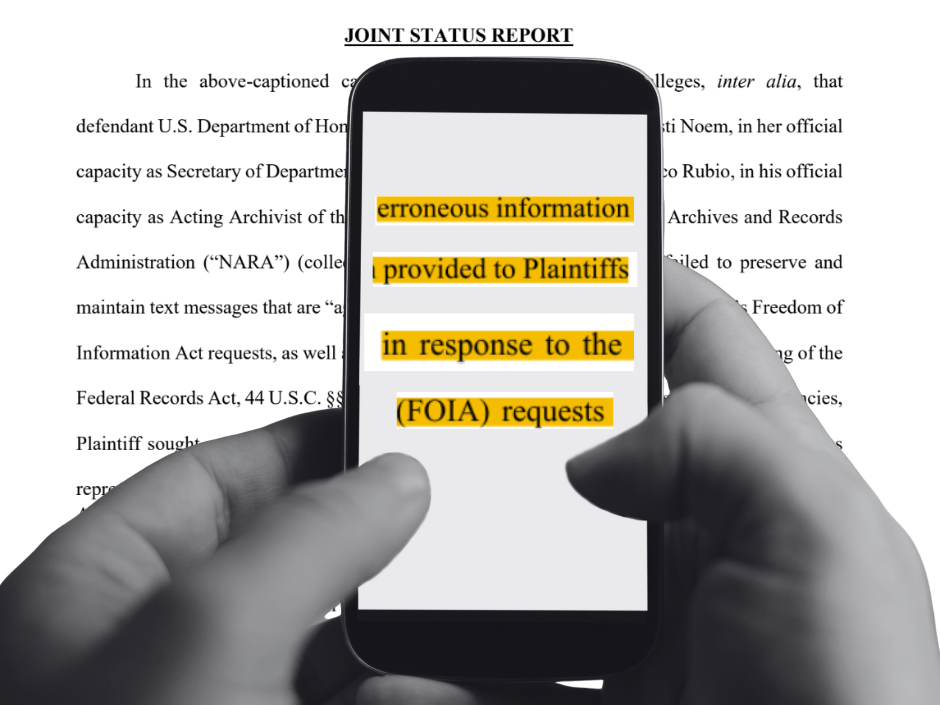DHS Admits It Provided “Erroneous” Information on Texts of Noem and DHS Brass, Hasn’t Confirmed It Followed Law
Thursday, following a court filing in American Oversight’s lawsuit against the Department of Homeland Security (DHS) over the agency’s initial claim that it failed to preserve the text messages of Secretary Kristi Noem and other top agency officials, we revealed the government has admitted its assertion that text messages were no longer preserved was “erroneous” […]

Thursday, following a court filing in American Oversight’s lawsuit against the Department of Homeland Security (DHS) over the agency’s initial claim that it failed to preserve the text messages of Secretary Kristi Noem and other top agency officials, we revealed the government has admitted its assertion that text messages were no longer preserved was “erroneous” — though the government has yet to provide evidence that the records we requested have been preserved as required by law.
“DHS has now admitted that it provided inaccurate information about whether Secretary Noem’s and other top agency officials’ text messages were properly preserved,” said Chioma Chukwu, Executive Director of American Oversight. “We’re talking about messages exchanged amid major national controversies — from the deployment of military forces on American streets to inhumane immigration crackdowns and deportations carried out in defiance of court orders. The public deserves to know whether these records still exist, and whether officials destroyed evidence of how those decisions were made. After misleading us for months, DHS wants us to trust that the law is being followed. But the agency has not turned over the records we requested nor has it provided details about whether senior officials’ text messages have been preserved in accordance with the law. It’s time for transparency — not more empty assurances.”
Today’s court filing contains declarations by government defendants, which include an explicit acknowledgement from DHS that the agency’s repeated claims to us that it no longer preserved the text messages of Secretary Noem and other top DHS officials were “erroneous.” Beyond that, the declarations describe DHS’s general policies for records management but do not state unequivocally that those policies have been followed. The agency acknowledges that it disabled its text-archiving system in April 2025, and now relies on individual officials to manually capture and forward their own messages — a practice that, by law, must be completed within 20 days of the original record being created. Yet DHS has not confirmed whether Secretary Noem, Deputy Secretary Troy Edgar, and senior advisers Rob Law and Corey Lewandowski have followed the law.
The agency also has not stated whether any forensic searches have been conducted on the officials’ devices or provided any other evidence that those messages still exist. Meanwhile, the National Archive and Records Administration’s (NARA) declaration confirms it instructed DHS on Sept. 3 to investigate the potential unauthorized destruction of records and notify NARA within 30 days of the outcome of that investigation — and as of Oct. 30, DHS still had not responded to that directive.
In July, we submitted a FOIA request seeking the text, Signal, and email communications of Noem and other top DHS officials related to the National Guard’s questionable Los Angeles deployment to quell protests over the administration’s mass deportation agenda. In its July 23 response, DHS stated that it could not search for responsive records because “text message data generated after April 9, 2025, is no longer maintained.”
We submitted follow-up FOIA requests on Aug. 21 seeking the July 2025 text messages of Noem and other DHS leaders as well as records reflecting those messages. Just two and a half hours later, DHS responded with a categorical “no records” determination for each request, stating that it “no longer has the capability to conduct a search of text messages.”
In October, we filed a lawsuit against DHS based on the agency’s previous assertion that it failed to preserve text messages from Secretary Noem and other top DHS officials as required by law. We also filed suit against the agency for failing to release text messages and other records that could shed light on DHS’s role in decisions ranging from military strikes and National Guard deployments in American cities to inhumane immigration enforcement and the upheaval of government operations.